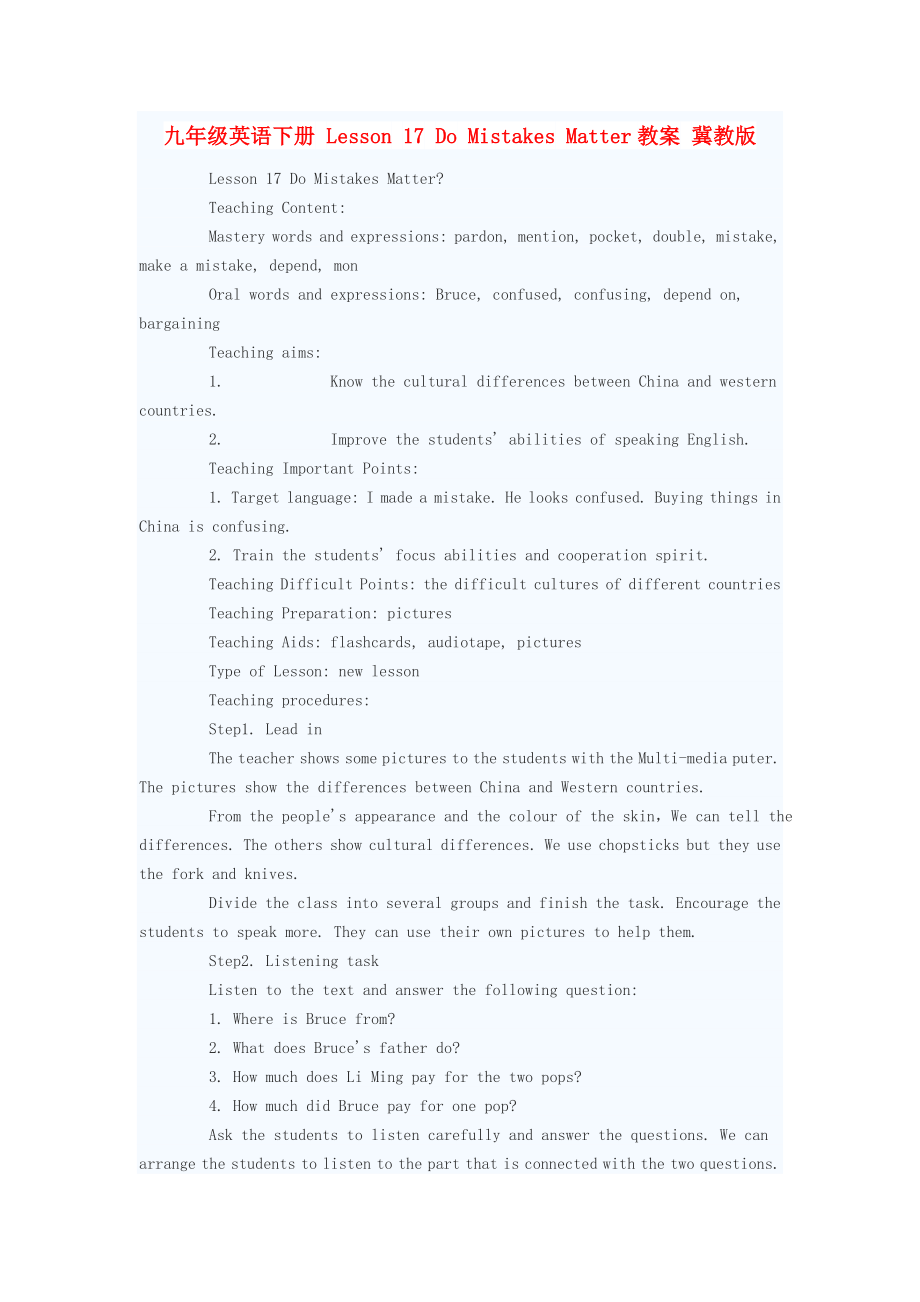《九年級(jí)英語(yǔ)下冊(cè) Lesson 17 Do Mistakes Matter教案 冀教版》由會(huì)員分享,可在線閱讀�,更多相關(guān)《九年級(jí)英語(yǔ)下冊(cè) Lesson 17 Do Mistakes Matter教案 冀教版(3頁(yè)珍藏版)》請(qǐng)?jiān)谘b配圖網(wǎng)上搜索。
1��、九年級(jí)英語(yǔ)下冊(cè) Lesson 17 Do Mistakes Matter教案 冀教版
Lesson 17 Do Mistakes Matter?
Teaching Content:
Mastery words and expressions: pardon, mention, pocket, double, mistake, make a mistake, depend, mon
Oral words and expressions: Bruce, confused, confusing, depend on, bargaining
Teaching aims:
2�����、
1.?????? Know the cultural differences between China and western countries.
2.?????? Improve the students' abilities of speaking English.
Teaching Important Points:
1. Target language: I made a mistake. He looks confused. Buying things in China is confusing.
2. Train the students' foc
3����、us abilities and cooperation spirit.
Teaching Difficult Points: the difficult cultures of different countries
Teaching Preparation: pictures
Teaching Aids: flashcards, audiotape, pictures
Type of Lesson: new lesson
Teaching procedures:
Step1. Lead in
The teacher shows some pictu
4��、res to the students with the Multi-media puter. The pictures show the differences between China and Western countries.
From the people's appearance and the colour of the skin��,We can tell the differences. The others show cultural differences. We use chopsticks but they use the fork and knives.
5、Divide the class into several groups and finish the task. Encourage the students to speak more. They can use their own pictures to help them.
Step2. Listening task
Listen to the text and answer the following question:
1. Where is Bruce from?
2. What does Bruce's father do?
3. How much
6����、 does Li Ming pay for the two pops?
4. How much did Bruce pay for one pop?
Ask the students to listen carefully and answer the questions. We can arrange the students to listen to the part that is connected with the two questions.
Step3. Read and find the new words:
He looks confused.
7、Buying things in China is confusing.
I made a mistake.
Let the students try to make sentences with the new words.
Step4. Reading task:
Read the text again and answer the questions:
What are Bruce and Li Ming doing?
Is Bruce confusing?
Where don't people try to change the price,
8�、in China or in North America?
Encourage the students to ask more questions by themselves.
Step5. Fill in the blanks with the right forms of the words given.
1.My brother is _______(迷惑的)。
2.It is so ______(迷惑的) a thing.
3.Does he often ______(犯錯(cuò)誤)�?
This part is used to check if they
9、 have grasped the new words.
Step6.Activity
Suppose you and Bruce are shopping, you are bargaining with the clerk. Bruce can bargain, too.
Divide the class into several groups and talks about the questions. After a while, let the students act their out in front of the class.
Encourage th
10���、e students to speak loudly in front of the class. Choose the best group and praise them.
Step7. Think about: What's the difference between people in China and North America when they are shopping?
Use the formal group to finish the task. When the students discuss, the teacher walks around the
11�、classroom to see if they need any help.
Step8. Talk about: Where would you like to buy things, in shopping center or market?
Let them debate the questions. As usual, the class can be divided into two groups. One group thinks the shopping center is good. The other thinks the market is better. L
12���、et them debate for five minutes. Then let one student in each group to sum the opinions of his own group.
Step9. Homework
Find more information about the differences between China and western countries.
Summary:
This interesting text is about bargaining in China. It's based on the differ
13���、ent cultures between Chinese and Western countries. In some countries in North America, people don't try to bargain, so some foreign friends feel confused when they buy things in China. Try to help them when you meet foreigners. Try to find more differences between Chinese and Western countries on the Internet.
 九年級(jí)英語(yǔ)下冊(cè) Lesson 17 Do Mistakes Matter教案 冀教版
九年級(jí)英語(yǔ)下冊(cè) Lesson 17 Do Mistakes Matter教案 冀教版

